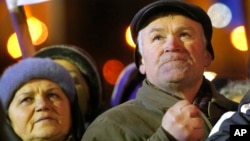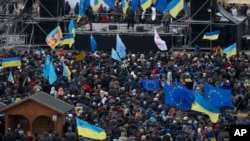KYIV —
Ukrainian President Viktor Yanukovych is set to head for China on Tuesday, leaving a country plunged into crisis by his decision to forego a free trade deal with Europe under pressure from Russia.
With pro-Europe demonstrators blockading the government's main building in Kyiv, their allies in parliament called for a vote of no confidence in the cabinet on Tuesday over what they say is a lurch back towards Soviet-style rule from Moscow.
Prime Minister Mykola Azarov said the government could not perform its basic functions which could affect the payment of pensions and salaries.
“This has all the signs of a coup d'etat. This is a very serious matter,” Interfax news agency quoted him telling the ambassadors of the European Union, United States and Canada.
He accused his opponents of planning to seize parliament, but the opposition said it was just planning to picket deputies before the debate.
“Some will picket outside of the cabinet of ministers, others will picket outside parliament, and we are voting for the resignation of the criminal government of Azarov,” far-right nationalist leader Oleh Tyahnybok said on Interfax news agency.
Even if the vote were to go ahead, it was unlikely to muster enough support to pass since the opposition parties have far fewer deputies than the 226 needed.
In Kyiv's Independence Square protesters, set up tented camps in preparation for a long campaign against Yanukovych's last-minute decision to reject the free trade deal, which had been due to be signed on Friday.
The security forces clashed with protesters over the weekend, but the area around parliament was quiet on Monday evening and activists from heavyweight boxing champion-turned- opposition-politician Vitaly Klitschko's party Udar (Punch) said they planned to send only a few people there on Tuesday.
On Monday, demonstrators halted traffic and called a general strike, seeking to force Yanukovich from office after about 35,000 people demonstrated at the weekend, the most since the pro-democracy “Orange Revolution” of nine years ago.
Ukraine's currency and bonds came under pressure, along with share prices, and the central bank was forced to assure people their savings were safe.
The United States said violence by the authorities against protesters on Saturday was unacceptable that reports of media representatives being targeted were “disturbing”.
Debt Fears
With temperatures dropping well below zero, the numbers of protesters have dropped sharply, and Yanukovych clearly felt the security situation was under control when he announced he would stick to a plan to travel on Tuesday to China, from which he is seeking loans and investment to avert a debt crisis.
The security forces report to the interior minister, who is a loyal lieutenant of Yanukovich and a close friend of his son.
But some felt leaving was unwise nevertheless.
“It is a very bad time to go abroad. The president's absence may make talks with the opposition much more difficult,” said Ukrainian political analyst Gleb Vyshlinsky.
Russia wants to draw Ukraine into a Moscow-led customs union and prevent it drawing closer to the EU, a move that would signal a historic shift towards the West and away from Kyiv's former Soviet masters in Moscow.
But the tug-of-war between Brussels and Moscow for influence in Ukraine has so far done little to alleviate its looming debt crisis and the China visit will involve the signing of at least 20 economic and trade agreements.
“Yanukovych is trying to show that the European Union and Russia are not the only possible partners for Ukraine,” said Volodymyr Fesenko of Ukraine's Penta think-tank.
However, he said Beijing may now demand assurances over Ukraine's political and economic stability, adding: “Ukraine is unlikely to secure direct financial aid [from China].”
Beijing has already provided the former Soviet republic with loans worth $10 billion, but the government must find more than $17 billion in 2014 to meet gas bills and debt repayments.
With pro-Europe demonstrators blockading the government's main building in Kyiv, their allies in parliament called for a vote of no confidence in the cabinet on Tuesday over what they say is a lurch back towards Soviet-style rule from Moscow.
Prime Minister Mykola Azarov said the government could not perform its basic functions which could affect the payment of pensions and salaries.
“This has all the signs of a coup d'etat. This is a very serious matter,” Interfax news agency quoted him telling the ambassadors of the European Union, United States and Canada.
He accused his opponents of planning to seize parliament, but the opposition said it was just planning to picket deputies before the debate.
“Some will picket outside of the cabinet of ministers, others will picket outside parliament, and we are voting for the resignation of the criminal government of Azarov,” far-right nationalist leader Oleh Tyahnybok said on Interfax news agency.
Even if the vote were to go ahead, it was unlikely to muster enough support to pass since the opposition parties have far fewer deputies than the 226 needed.
In Kyiv's Independence Square protesters, set up tented camps in preparation for a long campaign against Yanukovych's last-minute decision to reject the free trade deal, which had been due to be signed on Friday.
The security forces clashed with protesters over the weekend, but the area around parliament was quiet on Monday evening and activists from heavyweight boxing champion-turned- opposition-politician Vitaly Klitschko's party Udar (Punch) said they planned to send only a few people there on Tuesday.
On Monday, demonstrators halted traffic and called a general strike, seeking to force Yanukovich from office after about 35,000 people demonstrated at the weekend, the most since the pro-democracy “Orange Revolution” of nine years ago.
Ukraine's currency and bonds came under pressure, along with share prices, and the central bank was forced to assure people their savings were safe.
The United States said violence by the authorities against protesters on Saturday was unacceptable that reports of media representatives being targeted were “disturbing”.
Debt Fears
With temperatures dropping well below zero, the numbers of protesters have dropped sharply, and Yanukovych clearly felt the security situation was under control when he announced he would stick to a plan to travel on Tuesday to China, from which he is seeking loans and investment to avert a debt crisis.
The security forces report to the interior minister, who is a loyal lieutenant of Yanukovich and a close friend of his son.
But some felt leaving was unwise nevertheless.
“It is a very bad time to go abroad. The president's absence may make talks with the opposition much more difficult,” said Ukrainian political analyst Gleb Vyshlinsky.
Russia wants to draw Ukraine into a Moscow-led customs union and prevent it drawing closer to the EU, a move that would signal a historic shift towards the West and away from Kyiv's former Soviet masters in Moscow.
But the tug-of-war between Brussels and Moscow for influence in Ukraine has so far done little to alleviate its looming debt crisis and the China visit will involve the signing of at least 20 economic and trade agreements.
“Yanukovych is trying to show that the European Union and Russia are not the only possible partners for Ukraine,” said Volodymyr Fesenko of Ukraine's Penta think-tank.
However, he said Beijing may now demand assurances over Ukraine's political and economic stability, adding: “Ukraine is unlikely to secure direct financial aid [from China].”
Beijing has already provided the former Soviet republic with loans worth $10 billion, but the government must find more than $17 billion in 2014 to meet gas bills and debt repayments.

